Common Triggers and How to Find Heartburn Relief
Discovering the ins and outs of heartburn is essential for managing this uncomfortable condition. Heartburn occurs when stomach acid flows back into the esophagus, causing a burning sensation in the chest. It is a common condition that causes a burning sensation in the chest or throat, caused by stomach acid refluxing back into the esophagus, the tube that connects the mouth to the stomach. This reflux can occur when the lower esophageal sphincter (LES), a ring of muscle that separates the esophagus from the stomach, does not close properly or opens too frequently. Let’s delve into everything you need to know about heartburn. We will discuss the following topics:
Causes of heartburn
Risk factors for heartburn
Symptoms of heartburn
Diagnosis of heartburn
Indigestion
Acid reflux
Pregnancy and heartburn
What can heartburn mask
Prevention of heartburn
Complications of heartburn
Treatment of heartburn
Management of heartburn
Stomach healthy foods
Alcohol and heartburn
Herbal remedies for heartburn
Myths and heartburn
When to seek urgent medical care
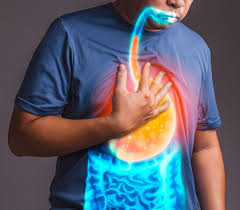
Causes of heartburn
It is typically caused by stomach acid refluxing back into the esophagus, which can occur for a number of reasons. Some common causes of include:
- Eating large meals: Consuming a large meal can put pressure on the LES, causing it to open and allowing stomach acid to reflux into the esophagus.
- Eating trigger foods: Certain foods or drinks, such as spicy or fatty foods, coffee, alcohol, and carbonated beverages, can weaken the LES and trigger heartburn.
- Lying down after eating: When you lie down after eating, gravity no longer helps keep stomach acid in the stomach, allowing it to reflux back into the esophagus.
- Being overweight or pregnant: Excess weight or pregnancy can put pressure on the stomach, pushing acid into the esophagus.
- Smoking: can weaken the LES and increase acid production, leading to heartburn.
- Hiatal hernia: is a condition in which the upper part of the stomach pushes up through the diaphragm, allowing stomach acid to reflux into the esophagus.
- Certain medications: such as nonsteroidal anti-inflammatory drugs (NSAIDs), can irritate the lining of the esophagus, leading to heartburn.
- Medical conditions: Certain medical conditions, such as gastroesophageal reflux disease (GERD), can cause chronic heartburn.
-
Alcohol: can be a trigger for heartburn in some people. When you consume alcohol, it relaxes the lower esophageal sphincter (LES), which is the muscle that normally keeps stomach acid from flowing back up into the esophagus. When the LES is relaxed, it can allow stomach acid to flow back up into the esophagus, causing heartburn. Additionally, alcohol can increase the production of stomach acid, which can also contribute to heartburn. Some types of alcohol may be more likely to trigger heartburn than others, such as red wine or beer, which are more acidic.
Symptoms of heartburn

The most common symptom of heartburn is a burning sensation in the chest or throat that typically occurs after eating, lying down, or bending over. Other symptoms of heartburn may include:
- Regurgitation of food or stomach acid into the mouth or throat
- Bitter or sour taste in the mouth
- Difficulty swallowing
- Feeling like there is a lump in the throat
- Nausea or vomiting
- Coughing or wheezing
- Hoarseness or sore throat
- Chest pain, which can sometimes be mistaken for a heart attack.
It is important to note that not everyone with heartburn experiences all of these symptoms, and some people may experience symptoms that are not listed here. If you experience any of these symptoms, especially if they are severe or persistent, it is important to seek medical attention to rule out any underlying medical conditions.
Diagnosis of heartburn
It is typically diagnosed based on a person’s symptoms and medical history. In most cases, a doctor can make a diagnosis based on the characteristic burning sensation in the chest or throat that occurs after eating or lying down. The doctor may also ask about any other symptoms, such as regurgitation, difficulty swallowing, or chest pain, to help determine the severity of the condition.
In some cases, additional testing may be needed to rule out other medical conditions or to assess the severity of the heartburn. Tests that may be used include:
- Endoscopy: A procedure in which a thin, flexible tube with a camera on the end is inserted through the mouth and into the esophagus and stomach to look for signs of inflammation, ulcers, or other abnormalities.
- Esophageal pH monitoring: A test in which a small tube is inserted through the nose and into the esophagus to measure the amount of acid reflux over a 24-hour period.
- Barium swallow: A test in which a person swallows a barium solution, which coats the lining of the esophagus and stomach and makes it visible on X-ray.
- Manometry: A test in which a thin, flexible tube is inserted through the nose and into the esophagus to measure the strength and coordination of the muscles used during swallowing.
- Blood tests: may be used to look for signs of infection or inflammation in the body.
Endoscopy

Endoscopy is a medical procedure in which a thin, flexible tube with a camera on the end, called an endoscope, is inserted through the mouth and into the esophagus, stomach, and small intestine to visually examine the lining of these organs. Endoscopy is commonly used to diagnose and treat a variety of digestive system problems, including heartburn, acid reflux, ulcers, and inflammatory bowel disease.
During an endoscopy, the patient is typically given a sedative to help them relax and feel more comfortable during the procedure. The endoscope is then carefully inserted through the mouth and guided down the throat and into the esophagus. As the endoscope is advanced, the doctor can use the camera to examine the lining of the esophagus, stomach, and small intestine for signs of inflammation, ulcers, tumors, or other abnormalities.
If any abnormalities are found during the endoscopy, the doctor may take a small tissue sample, called a biopsy, for further testing. The biopsy is painless and does not require any incisions or stitches.
Endoscopy is generally a safe procedure with few risks. However, as with any medical procedure, there is a small risk of complications, such as bleeding, infection, or perforation of the digestive tract. It is important to discuss the risks and benefits of endoscopy with your doctor before the procedure.
Indigestion

Indigestion, also known as dyspepsia, is a common digestive problem that causes discomfort or pain in the upper abdomen. It can be caused by a variety of factors, including eating too quickly, eating spicy or fatty foods, drinking too much alcohol or caffeine, and stress. Symptoms of indigestion may include:
- Pain or discomfort in the upper abdomen
- Feeling overly full or bloated
- Nausea or vomiting
- Belching or gas
- Acidic taste in the mouth
- Heartburn
- Loss of appetite
Indigestion is usually a mild and temporary condition that can be managed with lifestyle changes and over-the-counter medications. Treatment may include:
- Eating smaller, more frequent meals
- Avoiding spicy, fatty, or greasy foods
- Reducing intake of alcohol and caffeine
- Managing stress through exercise or relaxation techniques
- Taking antacids or other over-the-counter medications to reduce acid production or neutralize stomach acid
Acid reflux
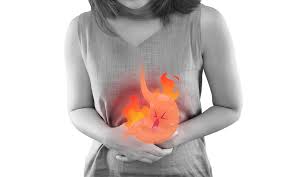
Acid reflux is a digestive disorder that occurs when stomach acid flows back up into the esophagus, the tube that connects the mouth to the stomach. This can cause a variety of symptoms, including:
- Heartburn: a burning sensation in the chest or throat
- Regurgitation: the sensation of stomach acid or food coming back up into the mouth
- Difficulty swallowing or feeling like there is a lump in the throat
- Coughing or wheezing
- Hoarseness or sore throat
- Nausea or vomiting
- Bad breath
Acid reflux occurs when the lower esophageal sphincter (LES), a muscular valve that normally keeps stomach acid from flowing back up into the esophagus, fails to close properly. This can be caused by a variety of factors, including:
- Eating large meals or lying down right after eating
- Being overweight or obese
- Pregnancy
- Hiatal hernia
- Smoking
- Certain medications, such as aspirin or ibuprofen
- Certain foods, such as citrus fruits, tomatoes, garlic, onions, and spicy or fatty foods
- Drinking alcohol or caffeine
Treatment for acid reflux may include lifestyle changes, such as eating smaller, more frequent meals, avoiding trigger foods, and not lying down for at least three hours after eating. Over-the-counter medications, such as antacids and H2 blockers, may also be used to reduce acid production and relieve symptoms. In severe cases, prescription medications or surgery may be necessary. It is important to talk to a healthcare provider if acid reflux symptoms are severe or persistent.
Peptic ulcer
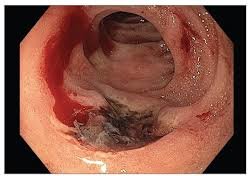
A peptic ulcer is an open sore that develops on the lining of the stomach, esophagus or small intestine. Peptic ulcers can be caused by an infection with the bacterium Helicobacter pylori (H. pylori), long-term use of nonsteroidal anti-inflammatory drugs (NSAIDs), such as aspirin or ibuprofen, smoking, and excessive alcohol consumption.
The most common symptom of peptic ulcers is abdominal pain, which can be dull, burning or gnawing in nature. The pain is typically located in the upper abdomen, and it may occur between meals or at night. Other common symptoms of peptic ulcers include:
- Indigestion
- Nausea
- Loss of appetite
- Bloating
- Belching
- Heartburn
- Vomiting
If left untreated, peptic ulcers can lead to serious complications, such as bleeding or perforation of the stomach or intestine. Diagnosis of peptic ulcers typically involves an upper endoscopy, a procedure in which a thin, flexible tube with a camera on the end is passed through the mouth and into the esophagus, stomach and small intestine to visually examine the lining of these organs.
Treatment for peptic ulcers may involve medications to reduce stomach acid production, antibiotics to eradicate H. pylori infection, or a combination of both. Lifestyle changes, such as avoiding trigger foods, quitting smoking and reducing alcohol consumption, may also be recommended. In some cases, surgery may be necessary to repair a perforated or bleeding ulcer.
GERD
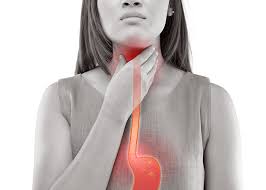
GERD, or gastroesophageal reflux disease, is a chronic digestive disorder in which stomach acid flows back up into the esophagus, causing irritation and inflammation. The most common symptom of GERD is heartburn, which is a burning sensation in the chest that can be accompanied by regurgitation of stomach contents into the mouth.
Other symptoms of GERD may include:
- Difficulty swallowing
- Feeling like there is a lump in the throat
- Chronic cough or hoarseness
- Chest pain
- Asthma symptoms
- Dental erosions or bad breath
GERD is caused by a weakened or malfunctioning lower esophageal sphincter (LES), which is the muscle that separates the esophagus from the stomach and helps prevent the backflow of stomach acid. Factors that can contribute to the weakening of the LES include obesity, pregnancy, hiatal hernia, smoking, and certain medications.
Treatment for GERD typically involves lifestyle modifications, such as avoiding trigger foods, losing weight, and elevating the head of the bed, as well as medications to reduce stomach acid production or neutralize acid. In some cases, surgery may be necessary to strengthen the LES or repair a hiatal hernia.
Pregnancy and heartburn

Heartburn is a common symptom during pregnancy, particularly during the second and third trimesters. The increase in heartburn during pregnancy is due to hormonal changes that relax the lower esophageal sphincter (LES), a muscular valve that normally prevents stomach acid from flowing back up into the esophagus. Additionally, as the uterus grows, it can put pressure on the stomach, causing stomach contents to back up into the esophagus.
Other factors that can contribute to heartburn during pregnancy include eating large meals, eating spicy or fatty foods, and lying down after eating. Symptoms of heartburn during pregnancy can range from mild to severe, and may be accompanied by regurgitation of stomach contents, nausea, and bloating.
To manage heartburn during pregnancy, lifestyle modifications may be recommended, such as eating smaller, more frequent meals, avoiding trigger foods, and not lying down for at least three hours after eating. Over-the-counter antacids, such as Tums or Rolaids, may also be used to relieve symptoms. It is important to talk to a healthcare provider before taking any medications during pregnancy.
If heartburn during pregnancy is severe or persistent, prescription medications may be recommended, such as proton pump inhibitors (PPIs) or H2 blockers. It is important to seek medical attention if heartburn during pregnancy is accompanied by other symptoms, such as difficulty swallowing, vomiting, or weight loss, as these may indicate a more serious condition.
What can heartburn mask
Heartburn can sometimes mask more serious conditions, especially if it is persistent or accompanied by other symptoms. Some conditions that heartburn can mask include:
- Angina: Heartburn and chest pain caused by angina can feel similar, and both may be relieved by antacids. However, angina is caused by reduced blood flow to the heart and can be a symptom of heart disease.
- Heart attack: Some people may mistake the symptoms of a heart attack for heartburn, especially if they have a history of acid reflux or gastroesophageal reflux disease (GERD). Symptoms of a heart attack may include chest pain or discomfort, shortness of breath, and pain in the arm, neck, or jaw.
- Peptic ulcer: Heartburn is a common symptom of peptic ulcer, but if left untreated, ulcers can cause serious complications such as bleeding or perforation of the stomach or intestine.
- Esophageal cancer: Persistent heartburn, especially if it occurs at night or is accompanied by difficulty swallowing, may be a symptom of esophageal cancer.
If heartburn is persistent or accompanied by other symptoms, it is important to seek medical attention to rule out more serious conditions. A healthcare provider may recommend tests such as an upper endoscopy or an electrocardiogram (ECG) to diagnose the underlying cause of symptoms.
Prevention of heartburn
There are several lifestyle modifications that can help prevent heartburn, such as:
- Avoiding trigger foods: Certain foods and drinks can trigger heartburn, such as spicy, fatty, or fried foods, chocolate, caffeine, and alcohol. Identifying and avoiding trigger foods can help prevent heartburn.
- Eating smaller, more frequent meals: Eating large meals can increase the likelihood of heartburn. Eating smaller, more frequent meals can help prevent heartburn by reducing the amount of stomach acid produced during digestion.
- Not lying down after eating: Lying down after eating can allow stomach acid to flow back up into the esophagus. Waiting at least three hours after eating before lying down can help prevent heartburn.
- Elevating the head of the bed: Elevating the head of the bed by six to eight inches can help prevent heartburn by keeping stomach acid from flowing back up into the esophagus.
- Losing weight: Obesity is a risk factor for heartburn. Losing weight can help reduce the frequency and severity of heartburn.
- Quitting smoking: Smoking can weaken the lower esophageal sphincter (LES), a muscular valve that normally prevents stomach acid from flowing back up into the esophagus. Quitting smoking can help prevent heartburn.
Complications of heartburn
While occasional heartburn is generally not a cause for concern, persistent or severe heartburn can lead to complications. Some complications of heartburn include:
- Esophagitis: The repeated exposure of the esophagus to stomach acid can lead to inflammation of the lining of the esophagus, a condition called esophagitis. Symptoms of esophagitis may include difficulty swallowing, chest pain, and nausea.
- Stricture: Repeated episodes of esophagitis can cause scar tissue to form, which can narrow the opening of the esophagus and make it difficult to swallow.
- Barrett’s esophagus: In some cases, chronic acid reflux can cause changes in the cells lining the lower esophagus. These changes, known as Barrett’s esophagus, may increase the risk of developing esophageal cancer.
- Dental problems: The acid from stomach reflux can erode tooth enamel and cause tooth decay, gum disease, and bad breath.
- Asthma: Acid reflux can worsen symptoms of asthma in some people, as stomach acid can irritate the airways and trigger an asthma attack.
It is important to seek medical attention if heartburn is persistent or severe, or if it is accompanied by other symptoms such as difficulty swallowing, vomiting, or weight loss. A healthcare provider may recommend tests such as an upper endoscopy to diagnose the underlying cause of symptoms and prevent complications.
Management of heartburn typically involves a combination of lifestyle modifications and medications. Here are some strategies that can be helpful for managing heartburn:
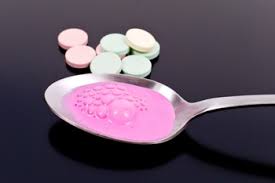
Lifestyle modifications include avoiding trigger foods, eating smaller, more frequent meals, not lying down after eating, elevating the head of the bed, losing weight, and quitting smoking.
Over-the-counter antacids, such as Tums or Rolaids, can be used to neutralize stomach acid and provide quick relief from heartburn symptoms. However, they are not recommended for long-term use.
Other prescription medications, such as Over-the-counter H2 blockers: H2 blockers (such as ranitidine and famotidine) work by reducing the production of stomach acid, and can provide longer-lasting relief than antacids. or Proton pump inhibitors (PPIs): PPIs (such as omeprazole and pantoprazole) are stronger medications that reduce the production of stomach acid and are often used for more severe or persistent cases of heartburn. These medications may take longer to work than antacids, but their effects can last longer.
Surgery: In some cases, surgery may be recommended to treat heartburn. One common procedure is called fundoplication, which involves wrapping the upper part of the stomach around the lower part of the esophagus to reinforce the lower esophageal sphincter (LES).
Herbal remedies for heartburn
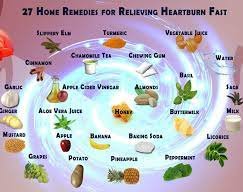
There are several herbal remedies that may help alleviate heartburn symptoms. It’s important to note that not all herbal remedies are safe or effective for everyone, and some may interact with medications or cause side effects. It’s always a good idea to talk to a healthcare provider before using any herbal remedies. Again, it’s important to talk to a healthcare provider before using any herbal remedies, especially if you have a medical condition or are taking medications.
Foods that are good for stomach health.
- Lean protein: Foods such as skinless chicken, fish, and lean cuts of beef or pork are good sources of protein without a lot of fat, which can be hard on the stomach.
- Whole grains: like oatmeal, brown rice, and whole wheat bread are high in fiber, which can help promote regular bowel movements and prevent constipation.
- Fruits and vegetables: are high in vitamins, minerals, and fiber, all of which can help keep the digestive system healthy. Some examples include berries, bananas, leafy greens, and root vegetables like carrots and sweet potatoes.
- Fermented foods: like yogurt, kefir, kimchi, and sauerkraut contain probiotics, which are beneficial bacteria that can help support a healthy gut microbiome.
- Nuts and seeds: are high in fiber and healthy fats and can help promote regular bowel movements. Some good choices include almonds, walnuts, chia seeds, and flaxseeds.
Ginger: 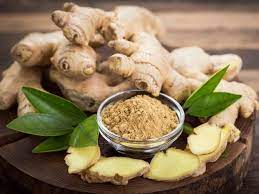 has anti-inflammatory properties and can help relieve nausea and other digestive symptoms. It can be consumed in various forms, such as fresh ginger root, ginger tea, or ginger supplements. It contains compounds called gingerols and shogaols, which have anti-inflammatory and antioxidant effects that can help reduce inflammation in the body. Ginger has been shown to be effective in reducing nausea and vomiting, and it may also help alleviate symptoms of heartburn and acid reflux.
has anti-inflammatory properties and can help relieve nausea and other digestive symptoms. It can be consumed in various forms, such as fresh ginger root, ginger tea, or ginger supplements. It contains compounds called gingerols and shogaols, which have anti-inflammatory and antioxidant effects that can help reduce inflammation in the body. Ginger has been shown to be effective in reducing nausea and vomiting, and it may also help alleviate symptoms of heartburn and acid reflux.
One way to consume ginger is to make ginger tea by steeping fresh ginger root in hot water for several minutes. You can also add fresh ginger to smoothies, soups, or other recipes. Ginger supplements are also available in capsule form, but it’s important to talk to a healthcare provider before taking any supplements.
Peppermint:  Peppermint oil has been shown to help reduce symptoms of indigestion and heartburn. It can be consumed in the form of tea or capsules. Peppermint is a plant that contains compounds called menthol and rosmarinic acid, which have anti-inflammatory and antispasmodic effects that can help reduce muscle contractions in the digestive tract. Peppermint has been shown to be effective in reducing symptoms of indigestion, bloating, and gas. However, some people with acid reflux or GERD may find that peppermint worsens their symptoms, as it can relax the lower esophageal sphincter and allow stomach acid to flow back up into the esophagus.
Peppermint oil has been shown to help reduce symptoms of indigestion and heartburn. It can be consumed in the form of tea or capsules. Peppermint is a plant that contains compounds called menthol and rosmarinic acid, which have anti-inflammatory and antispasmodic effects that can help reduce muscle contractions in the digestive tract. Peppermint has been shown to be effective in reducing symptoms of indigestion, bloating, and gas. However, some people with acid reflux or GERD may find that peppermint worsens their symptoms, as it can relax the lower esophageal sphincter and allow stomach acid to flow back up into the esophagus.
Peppermint can be consumed in the form of peppermint tea, which is made by steeping peppermint leaves in hot water for several minutes. It can also be consumed in the form of enteric-coated peppermint oil capsules, which release the oil in the small intestine rather than the stomach to avoid irritation. However, it’s important to talk to a healthcare provider before using peppermint for medicinal purposes, as it may interact with certain medications or cause side effects such as heartburn or allergic reactions in some people.
Licorice:  Licorice root has been used for centuries to treat digestive problems. It can help soothe the lining of the stomach and may help reduce symptoms of heartburn. It can be consumed in the form of tea or supplements. Licorice contains compounds called glycyrrhizic acid and flavonoids, which have anti-inflammatory and antioxidant effects that can help reduce inflammation in the body. Licorice may also help protect the lining of the stomach and may be effective in reducing symptoms of heartburn and acid reflux.
Licorice root has been used for centuries to treat digestive problems. It can help soothe the lining of the stomach and may help reduce symptoms of heartburn. It can be consumed in the form of tea or supplements. Licorice contains compounds called glycyrrhizic acid and flavonoids, which have anti-inflammatory and antioxidant effects that can help reduce inflammation in the body. Licorice may also help protect the lining of the stomach and may be effective in reducing symptoms of heartburn and acid reflux.
Licorice can be consumed in the form of licorice tea, which is made by steeping licorice root in hot water for several minutes. Licorice supplements are also available in capsule form or as chewable tablets. However, it’s important to note that licorice may interact with certain medications and can cause side effects such as high blood pressure, fluid retention, or low potassium levels in some people. Licorice should not be consumed in large amounts or for long periods of time without the supervision of a healthcare provider.
Chamomile:  has anti-inflammatory properties and can help relax the muscles in the digestive tract, which may help relieve symptoms of heartburn. It can be consumed in the form of tea or supplements. It contains compounds called flavonoids, which have anti-inflammatory and antioxidant effects that can help reduce inflammation in the body. Chamomile has been shown to be effective in reducing symptoms of indigestion, such as bloating, gas, and abdominal pain. Chamomile tea is a popular way to consume chamomile, which is made by steeping chamomile flowers in hot water for several minutes.
has anti-inflammatory properties and can help relax the muscles in the digestive tract, which may help relieve symptoms of heartburn. It can be consumed in the form of tea or supplements. It contains compounds called flavonoids, which have anti-inflammatory and antioxidant effects that can help reduce inflammation in the body. Chamomile has been shown to be effective in reducing symptoms of indigestion, such as bloating, gas, and abdominal pain. Chamomile tea is a popular way to consume chamomile, which is made by steeping chamomile flowers in hot water for several minutes.
Chamomile is generally considered safe, and it does not interact with most medications. However, some people may experience allergic reactions to chamomile, especially if they are allergic to other plants in the daisy family. In rare cases, chamomile may also cause drowsiness or interact with sedative medications. It’s important to talk to a healthcare provider before using chamomile for medicinal purposes, especially if you are pregnant, breastfeeding, or have any medical conditions or allergies.
Slippery elm:  contains a substance that can help coat and soothe the lining of the esophagus and stomach, which may help reduce symptoms of heartburn. It can be consumed in the form of tea or supplements. The inner bark of the slippery elm tree contains a substance called mucilage, which swells when it comes into contact with water and can help soothe and coat the lining of the throat, stomach, and intestines. Slippery elm may be effective in reducing symptoms of heartburn and acid reflux, as well as other digestive disorders such as diarrhea and irritable bowel syndrome (IBS).
contains a substance that can help coat and soothe the lining of the esophagus and stomach, which may help reduce symptoms of heartburn. It can be consumed in the form of tea or supplements. The inner bark of the slippery elm tree contains a substance called mucilage, which swells when it comes into contact with water and can help soothe and coat the lining of the throat, stomach, and intestines. Slippery elm may be effective in reducing symptoms of heartburn and acid reflux, as well as other digestive disorders such as diarrhea and irritable bowel syndrome (IBS).
Slippery elm can be consumed in the form of a tea, which is made by adding powdered slippery elm bark to hot water and steeping for several minutes. It is also available in capsule form or as a powder that can be mixed with water or other liquids. Slippery elm is generally considered safe, but it may interact with certain medications, and it should not be taken within two hours of other medications to avoid interference with their absorption. It’s important to talk to a healthcare provider before using slippery elm for medicinal purposes, especially if you are pregnant, breastfeeding, or have any medical conditions or allergies.
Honey:  is a natural sweetener that has been used for centuries for its health benefits, including for digestive health. It may help soothe the lining of the esophagus and may have antibacterial properties that can help prevent infections in the digestive tract. Some studies have also suggested that honey may help reduce symptoms of heartburn and acid reflux. However, it’s important to note that honey is still a sweetener and can still contribute to heartburn and other digestive symptoms if consumed in large amounts. Additionally, some people may be allergic to honey or may experience side effects such as bloating or diarrhea.
is a natural sweetener that has been used for centuries for its health benefits, including for digestive health. It may help soothe the lining of the esophagus and may have antibacterial properties that can help prevent infections in the digestive tract. Some studies have also suggested that honey may help reduce symptoms of heartburn and acid reflux. However, it’s important to note that honey is still a sweetener and can still contribute to heartburn and other digestive symptoms if consumed in large amounts. Additionally, some people may be allergic to honey or may experience side effects such as bloating or diarrhea.
If you’re interested in using honey as a natural remedy for heartburn, it’s best to choose raw, unpasteurized honey, which may have more health benefits than processed honey. You can consume honey on its own or add it to other remedies such as ginger tea or chamomile tea. However, as with any natural remedy, it’s always a good idea to talk to a healthcare provider before using honey for medicinal purposes.
Gum: Chewing gum may help reduce symptoms of heartburn and acid reflux by increasing the production of saliva, which can help neutralize stomach acid and wash it away from the esophagus. Chewing gum also stimulates the muscles in the digestive tract, which can help move food through the system and reduce the risk of acid reflux.
It’s important to choose sugar-free gum, as sugar can actually increase the production of stomach acid and exacerbate heartburn symptoms. It’s also important to avoid gum flavors that may trigger heartburn, such as mint or citrus. Some people may find that chewing gum worsens their heartburn symptoms, so it’s important to pay attention to how your body responds and adjust your habits accordingly. Chewing gum should not be used as a substitute for other heartburn treatments or lifestyle changes.
Dos and don’ts regarding heartburn

Here are some dos and don’ts for managing heartburn:
Dos:
- Eat smaller, more frequent meals throughout the day
- Chew your food thoroughly and take your time while eating
- Maintain a healthy weight and exercise regularly
- Elevate the head of your bed to prevent stomach acid from flowing back into the esophagus while you sleep
- Wear loose-fitting clothing to avoid putting pressure on the abdomen
- Keep a food diary to track which foods and drinks trigger your heartburn symptoms
- Drink plenty of water throughout the day to stay hydrated
Don’ts:
- Don’t eat large meals before bedtime
- Don’t lie down or recline immediately after eating
- Avoid foods and drinks that trigger your heartburn symptoms, such as spicy or acidic foods, caffeine, alcohol, and carbonated beverages
- Don’t smoke or use tobacco products, as they can increase the risk of heartburn and other digestive issues
- Avoid tight-fitting clothing, especially around the waistline
- Don’t rely solely on antacids or other medications to manage your heartburn; make lifestyle changes to address the root cause of the problem.
Myths and heartburn
There are several myths surrounding heartburn. Here are a few:
Myth: Only people with a history of heartburn or acid reflux experience heartburn. Fact: Anyone can experience heartburn, even if they’ve never had it before.
Myth: Heartburn is caused by too much stomach acid. Fact: Heartburn is usually caused by stomach acid flowing back into the esophagus, but it can also be caused by too little stomach acid.
Myth: Heartburn is a harmless condition that doesn’t need to be treated. Fact: While occasional heartburn is common and usually not a cause for concern, frequent or severe heartburn can damage the lining of the esophagus and lead to complications.
Myth: Drinking milk can help relieve heartburn. Fact: Milk may provide temporary relief from heartburn, but it can actually make symptoms worse in the long run by stimulating the production of stomach acid.
Myth: Heartburn only occurs after eating spicy or acidic foods. Fact: While spicy and acidic foods can trigger heartburn in some people, there are many other factors that can contribute to heartburn, such as overeating, eating too quickly, and certain medications.
It’s important to separate fact from fiction when it comes to heartburn and to seek advice from a healthcare provider if you have frequent or severe symptoms.
When to seek urgent medical care
While occasional heartburn is common and usually not a cause for concern, there are situations when you should seek urgent medical care for your heartburn symptoms. Here are some signs and symptoms that may indicate a medical emergency:
- Chest pain or pressure that is not relieved by antacids or other heartburn treatments
- Shortness of breath, sweating, or lightheadedness along with chest pain or pressure
- Severe or persistent heartburn that lasts for several hours or days
- Difficulty swallowing or painful swallowing
- Vomiting blood or passing black, tarry stools
- Unintentional weight loss
- A persistent cough or hoarseness
- Anemia or other symptoms of internal bleeding
If you experience any of these symptoms, seek medical attention right away. These symptoms could indicate a more serious condition, such as a heart attack, gastrointestinal bleeding, or esophageal cancer. It’s always better to err on the side of caution and seek medical help if you’re unsure about your symptoms.
Disclaimer: The information provided in this content is for general informational purposes only. It is not intended as medical or healthcare advice, diagnosis, or treatment. Always seek the advice of a qualified healthcare professional with any questions you may have regarding a medical condition or healthcare decisions.

